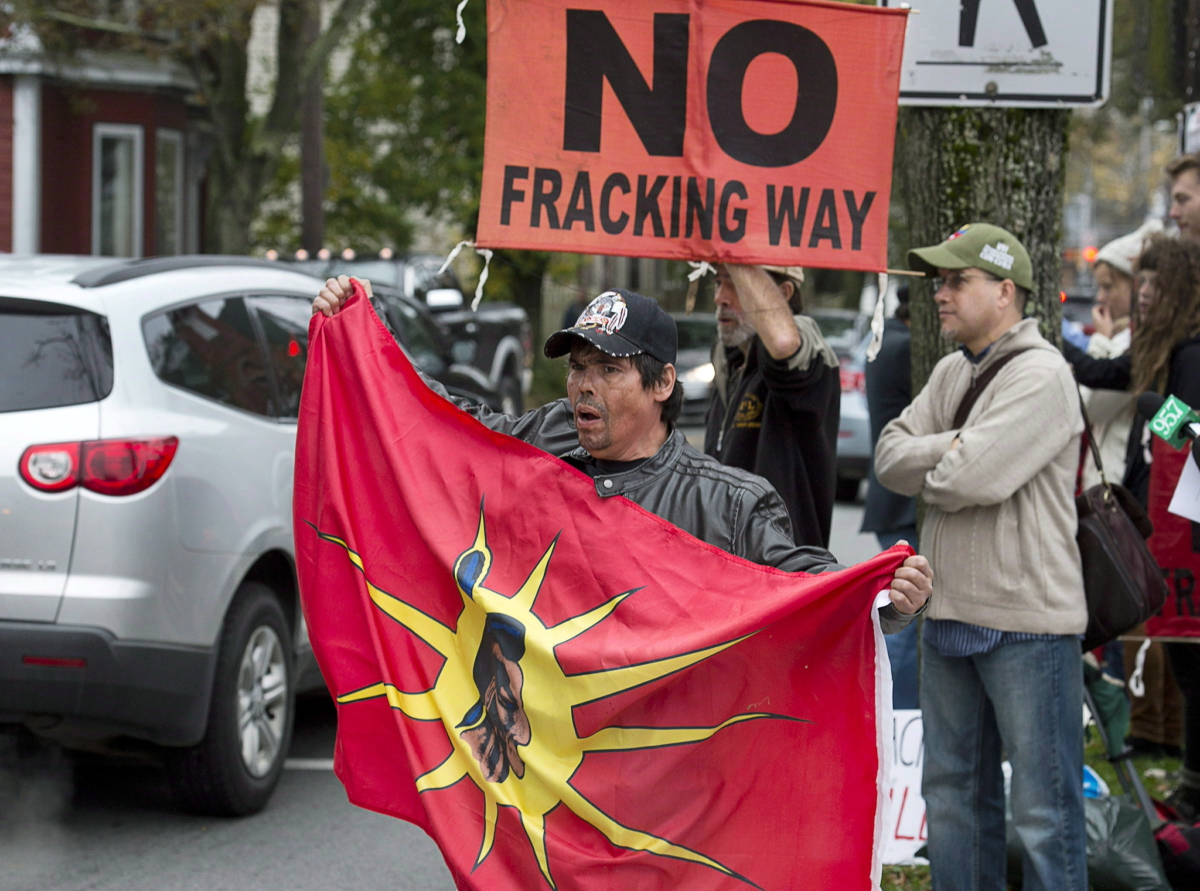Support strong Canadian climate journalism for 2025
New Brunswick can count on a huge backlash if it follows through on its recent comments about fracking natural gas, six First Nations chiefs in the province say.
“The issue could get ugly here,” Chief Allan Polchies Jr. of Sitansisk, St.Mary’s First Nation, told Canada’s National Observer.
In the past few months, Premier Blaine Higgs has been ramping up his support for fracked gas, a fossil fuel made mostly of methane. On Wednesday, he reportedly told business publication allNewBrunswick he would pursue fracked gas development regardless of buy-in from First Nation communities across the province.
According to a press release from the Wolastoqey Nation, Higgs told the publication if First Nations don't want to be involved, “There comes a time when you just gotta find a way to move on.” The comment marks a stark contrast to his State of the Province Address in February, where he said he wouldn’t pursue fracking without collaboration from First Nations.
On Thursday, the Wolastoqey Nation — which represents the Matawaskiye (Madawaska), Wotstak (Woodstock), Neqotkuk (Tobique), Bilijk (Kingsclear), Sitansisk (St. Mary's) and Welamuktok (Oromocto) First Nations — spoke out against Higgs’ comments. The nation called out the premier for dodging his responsibility to consult and get support from Indigenous communities.
Mi’gmawe’l Tplu’taqnn Inc. (MTI), a group representing the nine Mi’gmaq communities in New Brunswick, also criticized the Premier's remarks.
“To date, the Province has not been willing to commit to a proper consultation and impact assessment process, instead trying to force First Nations leaders to sign agreements supporting development without consultation. As a result, there are no active discussions on natural gas development between the Government of New Brunswick and the communities MTI represents,” the press statement said.
“Higgs should have learned from 2013, the last time his government had frack-dreams shut down by Indigenous people. We’ll do it again, and we’ll do it with the support of New Brunswickers,” said Chief Shelley Sabattis of Welamukotuk, Oromocto First Nation.
In 2013, heated protests against fracking in New Brunswick led to dozens of arrests and a review of the way the police handled the demonstrations. The following year, the province placed a moratorium on fracking. According to the provincial government, the moratorium will not be lifted until “a social licence [is] in place” and “a process [is] in place to respect our obligations under the duty to consult with First Nations,” among other requirements.
The Wolastoqey Nation also pointed out the dangers of fracking. Fracked, or shale, gas is extracted through a drilling process that injects water, chemicals and sand underground at extremely high pressures. The process has been found to leak methane, a potent greenhouse gas. Shale gas extraction in the United States was partly to blame for a global spike in planet-warming methane emissions, according to 2019 research from Cornell University. There is also evidence fracking contaminates groundwater and that the chemicals used in the process cause health problems in nearby communities.
Canada’s National Observer reached out to Higgs’ office for further comment but did not receive a response in time for publication.
The premier, who is a former Irving Oil executive, has been in Europe this week pitching fracked gas to European markets, along with small modular nuclear reactors and hydrogen. As reported by the CBC, Higgs is presenting fracked gas as a “transition fuel” as the world moves away from other fossil fuels like oil and coal. On Wednesday, New Brunswick’s Port of Belledune signed a green hydrogen agreement with the Port of Rotterdam in the Netherlands.
The pushback comes amid rising tensions between the province and First Nations communities over fracking industry development. In March, Higgs sent First Nations in the province letters encouraging their support for the development of a shale gas reserve near Sussex, saying they could see significant profits come their way if the plan moves forward.
Last April, the premier said he was pulling out of gas revenue tax-sharing agreements with 13 Mi'kmaq and Wolastoqey First Nations. The agreement meant First Nations kept the majority of on-reserve gas tax revenue, an important source of income.
Pabineau First Nation Chief Terry Richardson told Canada’s National Observer on Tuesday that the pullout, followed by the request for Indigenous buy-in for shale gas expansion, feels like “blackmail” and stresses he does not support any development of the fossil fuel.
Chief Tim Paul of Wotstak, Woodstock First Nation, summed up the Wolastoqey Nation’s position. “Our message to any country or company placing their energy hopes or plans in Blaine Higgs is simple: keep looking,” Paul said.
“This man has repeatedly gone back on his word and attempted to bend our own words against us. He is not a suitable partner for any sort of business.”
This article has been updated to include comments from MTI






Comments
Whatever your Maritime province, you have an awful lot of windpower right next door, and a half-gigawatt of tidal power. Exploiting those will take some learnings - tidal is particularly tricky, may never work - but if the Maritimers can crack (pardon me) those engineering problems, they'll have energy forever. Nothing runs dry faster than fracking.
"The premier, who is a former Irving Oil executive"
. . . Of course he is.
Note that the former oil executive is also pushing small modular reactors and hydrogen. Once again showing that SMRs and most hydrogen pushes are greenwashing and delay by the oil sector.
He learned from the best......
TAX DODGERS, THE UGLY TRUTH
By Stephen KimberIn
In 1972, Kenneth Colin Irving suddenly disappeared from the province in which he had been born, built his business empire and prospered.
Poof... Gone.
But then, like magic, he immediately popped
backed up again, freshly re-minted, no longer a New Brunswicker but now a Bermudian. Canadians for Tax Fairness estimates that, during that presto-change-o process, Irving “stashed at least $3 billion of his assets in Bermuda.”
Bermuda, of course, is what one critic has described as “the North Korea of offshore centres,” a happy hunting ground for international tax avoiders.
We are talking, of course, about those Irvings: our revered oil and gas, newsprint, newspaper, toilet paper, shipbuilding, ship repairing, marine terminal constructing, heavy equipment renting (phew!... take a breath), railroading, trucking, home renovating, french- fry-making, New Brunswick-owning Irvings.
Although most of the businesses from which Irving created his wealth were — and are — rooted in New Brunswick, their profits immediately began flowing to his new residence in Bermuda, neatly bypassing the Canadian taxman.
That's still going on. The Radio-Canada investigative show Enquête did an update this past season. More accounting sleight of hand.
Irving Oil had $250-million profit when it won tax break from city ...
Irving Oil raked in a quarter of a billion dollars in profits in the same year it persuaded Saint John city council and the New Brunswick government to hand it a 25-year tax break, leaked documents show.
(Reuters) - Irving Oil's refinery in the Canadian province of New Brunswick spewed an excessive amount of ash-like catalyst into the surrounding city of Saint John at least a dozen times since 2010 as regulators launched and later abandoned a study of its health impacts, according to filings reviewed by Reuters.
OTTAWA, September 28, 2012 — The Competition Bureau announced today that criminal charges have been laid against Irving Oil and Mr. Serge Parent, manager of Irving Oil for the province of Quebec, for fixing the price of retail gasoline in Victoriaville, Thetford Mines and Sherbrooke, Quebec.
CALGARY – After failing to secure Western Canadian oil via the scrapped West-to-East Energy East pipeline back in 2017, Irving Oil Ltd.’s finally been able to get federal approval for a new route to connect the oilsands to its refinery on the East Coast.
But this time it will circumvent provincial and environmental opposition faced during efforts to build that pipeline, as the oil will be shipped on foreign tankers from British Columbia to its refinery in Saint John, New Brunswick, via the Panama Canal.